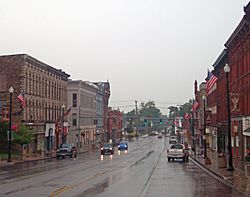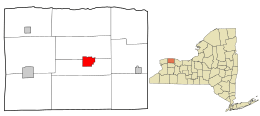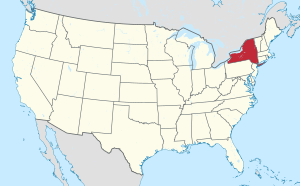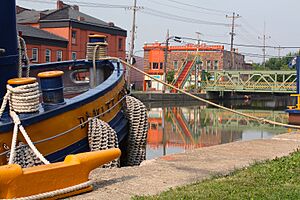Albion (village), New York facts for kids
Quick facts for kids
Albion
Newport
|
|
|---|---|

Looking north along Main Street in downtown Albion
|
|
| Etymology: From archaic name for Great Britain | |

Location in Orleans County and the state of New York.
|
|

Location of New York in the United States
|
|
| Country | United States |
| State | New York |
| County | Orleans |
| Settled | 1812 |
| Incorporated | 1828 |
| Government | |
| • Type | Village Hall |
| Area | |
| • Total | 2.92 sq mi (7.56 km2) |
| • Land | 2.92 sq mi (7.56 km2) |
| • Water | 0.00 sq mi (0.00 km2) |
| Elevation | 540 ft (160 m) |
| Highest elevation
(Two areas near S boundary)
|
600 ft (200 m) |
| Lowest elevation
(Former quarries N of St. Joseph's Cemetery)
|
440 ft (130 m) |
| Population
(2020)
|
|
| • Total | 5,637 |
| • Density | 1,930.48/sq mi (745.47/km2) |
| Time zone | UTC-5 (EST) |
| • Summer (DST) | UTC-4 (EDT) |
| ZIP code |
14411
|
| Area code | 585 |
| FIPS code | 36-01033 |
| GNIS feature ID | 2391504 |
| Wikimedia Commons | Albion, New York |
Albion is a village located in Orleans County, New York, in the state of New York, United States. In 2020, about 5,637 people lived there. It's right in the middle of Orleans County, partly in the town of Albion and partly in Gaines. Albion is the main town, or county seat, for Orleans County. It's about 30 miles (48 km) west of Rochester and is part of the larger Rochester area.
Contents
History of Albion Village
Early Settlement and Growth
The Albion area was first settled by European Americans in 1812. Not many people lived here at first. But then, it was announced that the Erie Canal would be built through this area. This news brought more people to the village.
In 1822, a businessman named Nehemiah Ingersoll bought a lot of land. This land was near where the canal and Oak Orchard Road would meet. Oak Orchard Road was the main north-south road back then. Soon, the land was divided into smaller plots. The village, which was called Newport at the time, started to grow.
Becoming the County Seat
Orleans County was created two years later. State officials looked at both Gaines and Newport to be the county seat. They chose Newport in 1826. This was because it was on the canal and near the West Branch of Sandy Creek. A mill had already been built there.
The next year, the village changed its name to Albion. This was to avoid confusion with another town called Newport in Oneida County. In 1828, Albion officially became an incorporated village.
Historic Buildings in Albion
Several important buildings in Albion are listed on the National Register of Historic Places. These include:
- The William V. N. Barlow House
- The North Main–Bank Streets Historic District
- The Orleans County Courthouse Historic District
- The Tousley-Church House
- The United States Post Office
Geography and Location
Albion is located at 43°14′49″N 78°11′28″W / 43.24694°N 78.19111°W. The village covers a total area of about 3.0 square miles (7.7 km2), and all of it is land.
Waterways and Roads
The famous Erie Canal flows right through Albion. This canal was very important for trade and travel in the past.
Albion is also where two main highways meet:
- NYS Route 31 (East Avenue and West Avenue) runs east-west.
- NYS Route 98 (Main Street) runs north-south.
- NYS Route 279 connects with NY-98 just north of Albion.
Distance to Nearby Cities
Albion is about 30 miles (48 km) west of Rochester, New York. It is also about 43 miles (69 km) northeast of Buffalo, New York.
Population and People
| Historical population | |||
|---|---|---|---|
| Census | Pop. | %± | |
| 1850 | 2,251 | — | |
| 1860 | 2,970 | 31.9% | |
| 1870 | 3,322 | 11.9% | |
| 1890 | 4,586 | — | |
| 1900 | 4,477 | −2.4% | |
| 1910 | 5,016 | 12.0% | |
| 1920 | 4,683 | −6.6% | |
| 1930 | 4,878 | 4.2% | |
| 1940 | 4,660 | −4.5% | |
| 1950 | 4,850 | 4.1% | |
| 1960 | 5,182 | 6.8% | |
| 1970 | 5,122 | −1.2% | |
| 1980 | 4,897 | −4.4% | |
| 1990 | 5,863 | 19.7% | |
| 2000 | 7,438 | 26.9% | |
| 2010 | 6,056 | −18.6% | |
| 2020 | 5,637 | −6.9% | |
| U.S. Decennial Census | |||
In 2000, there were 7,438 people living in Albion. There were 2,307 households and 1,444 families. The population density was about 2,501.8 people per square mile (966.0/km2).
Diversity in Albion
The people living in Albion come from many different backgrounds. In 2000, the population was made up of:
- 73.88% White
- 18.20% African American
- 0.69% Native American
- 0.58% Asian
- 0.08% Pacific Islander
- 4.99% from other races
- 1.59% from two or more races.
About 9.32% of the population was Hispanic or Latino.
Household Information
Many households in Albion have children. In 2000, 34.7% of households had children under 18 living with them. The average household had 2.54 people. The average family had 3.14 people.
Age Distribution
The population in Albion is spread across different age groups:
- 23.3% were under 18 years old.
- 11.0% were from 18 to 24 years old.
- 37.3% were from 25 to 44 years old.
- 17.1% were from 45 to 64 years old.
- 11.2% were 65 years or older.
The average age in the village was 33 years.
Education in Albion
Albion has good educational opportunities:
- The Albion Central School District serves students from kindergarten through high school.
- A branch campus of Genesee Community College is also located here. This college offers higher education courses.
Transportation
Public transportation in Albion is provided by the OTS. This is part of the Rochester Genesee Regional Transportation Authority (RGRTA). It helps people get around the village and to nearby areas.
Economy and Jobs
Albion is an important trading and shipping village for a rich farming area. Farmers in the region grow many crops, especially:
In the past, Albion also had several quarries that produced Medina Sandstone. This stone was used in many buildings.
Notable People from Albion
Many interesting people have connections to Albion:
- Grace Bedell (1848–1936): When she was 11, she suggested to Abraham Lincoln that he grow a beard.
- Sanford E. Church (1815–1880): Born in Albion, he became an important politician and judge in New York.
- Tommy Colella (1918-1992): A retired professional football player.
- John Cunneen (1848–1907): An Irish immigrant and lawyer who became New York State Attorney General.
- Noah Davis (1818-1902): A politician and judge, he was a former US Congressman.
- Elizabeth H. Denio (1842-1922): Born in Albion, she was a professor at Vassar and Wellesley Colleges. She also helped start Rochester's Memorial Art Gallery.
- Geoffrey Giuliano (1953– ): An author, actor, and radio show host who lived in Albion for many years.
- Henry Moore Harrington (1849-1876): Born in Albion, he was a soldier killed at the Battle of Little Bighorn.
- Elizur K. Hart (1841–1893): Born in Albion, he founded a newspaper and was a US Congressman.
- Charles H. Holmes (1827–1874): Born in Albion, he was a US Congressman.
- Charles W. Howard (1896–1966): Famous for portraying Santa Claus.
- Derek Kinder (1986– ): A football player drafted by the Chicago Bears.
- Charles H. Nesbitt (1947– ): A decorated Vietnam veteran and politician.
- Henry "Hank" Porter (1900-1951): Born in Albion, he was an artist for Walt Disney. He created many drawings related to the war effort during World War Two.
- George Pullman (1831–1897): A famous businessman who created sleeper cars for trains. He lived in Albion and built the Pullman Memorial Universalist Church in memory of his parents.
- Benjamin Titus Roberts (1823-1893): He founded the Free Methodist Church of North America.
- John G. Sawyer (1825-1898): The last US Congressman elected from Orleans County.
See also
 In Spanish: Albion (villa) para niños
In Spanish: Albion (villa) para niños


